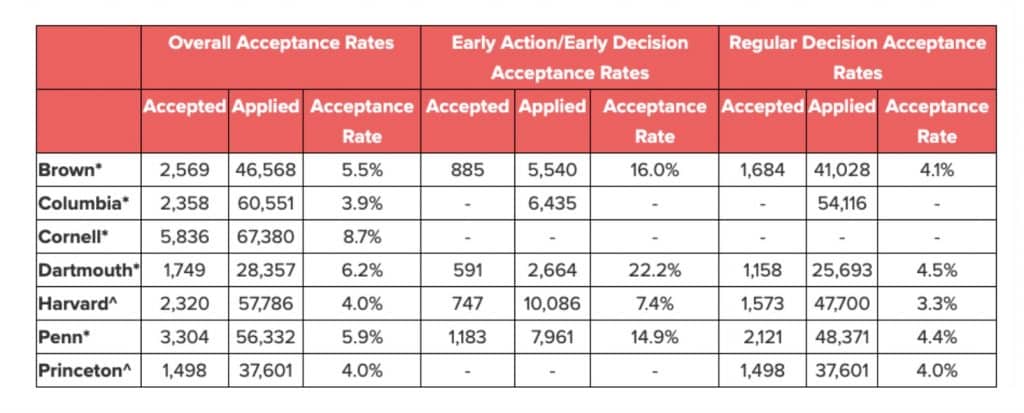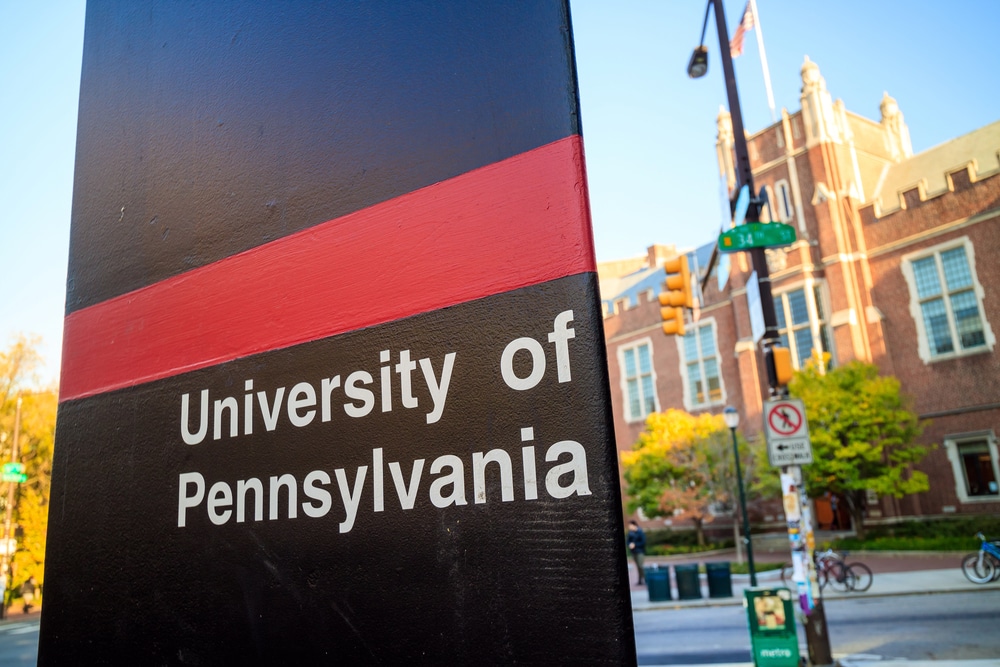How Hard Is It to Get Into Penn?
For students interested in attending one of the best schools in the United States, the historic and prestigious University of Pennsylvania – or Penn as it is often called – is often at the top of the list.
But how hard is it to get into Penn? Of course, that is an important question for any student to ask. That’s especially true if that student is thinking about submitting applications to some of the most prestigious schools in the country, such as Harvard, Stanford, UChicago and Penn.
At AdmissionSight, we know that an important aspect of enjoying a successful application experience is by knowing what you are setting yourself up for. Of course, no student should be dissuaded from applying to their dream schools, but it is also important to maintain a realistic approach in terms of the schools that a student targets.
When it comes to getting into Penn or similar schools, students need to be able to prove that they have been incredibly productive and positive students throughout the four years of their high school experience. So, learning about the ways to get into Pennsylvania University, as well as what the school and its admissions officers expect out of its applicants is very important.
So, if you are curious about learning just that and want to figure out ways to improve your chances of getting into Penn, then you have come to the right place!
Let’s get started on breaking down the crucial information to know so that you can get an answer to the question, “How hard is it to get into Penn?”
University of Pennsylvania’s admission requirements
When it comes to learning about the kinds of requirements students are expected to meet when applying to top colleges and universities, it is important to know that very few schools have actual “requirements” when it comes to the admissions.
Of course, students have to send in the material that is required of them, but we are more referring to grade point average thresholds, standardized test thresholds and more.
The truth is that any student can apply to any school they wish, as long as they can send in the required material. Whether or not any given student will actually succeed in getting, however, is of course a completely different situation.
So when we are talking about requirements, we are more just talking about the typical grades and scores that we have seen students earn who go on to enjoy success in the admissions process at Penn. Of course, the most important factor to start when having this conversation is the grade point average.
The level at which a high school student is able to perform during high school is going to give admissions committees at top schools like Penn a lot of information that they need to decide whether or not that student is a good fit.
More importantly, perhaps, it gives those admissions officers a better ability to predict whether that student will not just survive, but actually thrive when given the opportunity to take part in Penn’s rigorous and competitive academic culture.
When it comes to the average grade point average that high school students who go on to get accepted into Penn, that number is a highly impressive 3.9 GPA. Considering the fact that a perfect unweighted grade point average is a 4.0, you should already be getting a pretty clear idea of just how high the expectations really are at a school like Penn.
But it is about a lot more than just enrolling in classes and getting great grades in them. In fact, it is just as much about what kinds of classes a student decides to take during high school.
Most importantly, students need to put an emphasis on enrolling in difficult and advanced courses as early as they can. At most schools, AP or IB courses are offered, and admissions officers absolutely look for these classes on applicants’ transcripts.
There are two basic reasons why students who want to get into Penn need to prioritize enrolling in advanced high school courses. Those reasons are:
- AP and IB courses are modeled directly after introductory undergraduate classes both in terms of difficulty and subject matter and in the way that the classes are actually structured. Students who are able to succeed in this structure really help themselves when it comes to proving to admissions officers that they will be able to enjoy similar success at the university level.
- Beyond that, AP and IB courses are actually graded on a grade point average scale out of 5.0 rather than 4.0. For that reason, many students who apply to top schools will end up sending in a transcript with a GPA that is above that of a 4.0! Remember, that 3.9 average for Penn applicants is just that, and average. It is quite likely that there are many students who are coming in a bit below average, and many more who are coming in well over that average. Taking AP or IB courses and earning A grades is going to dramatically improve your grade point average.
One final thing to mention when it comes to a student’s transcript is the kinds of classes that Penn admissions officers look for. Again, there is no list of required courses, but admissions officers definitely do look out for this general breakdown of core classes that a student has taken in high school:
- English: four years, with significant emphasis on writing and literature.
- Mathematics: four years of any rigorous mathematics incorporating a solid grounding in fundamental skills (algebra, geometry, trigonometry). We also welcome preparation in skills related to statistics, data science and calculus.
- History/Social Studies: three or more years, with courses that include the writing of essays.
- Science: three or more years of laboratory science (including biology, chemistry and physics).
- Foreign Language: three or more years of the same foreign language.
Students are also encouraged to invest their time and energy in courses that allow them to explore and pursue their passions!
University of Pennsylvania SAT and ACT scores
Another important aspect of the application process at the vast majority of schools in the United States for decades has been taking a standardized test and sending in your score.
The two options students have had when it comes to standardized tests in the U.S. are the SAT or the ACT. While the importance of these exams have changed dramatically in recent years, there are also some key reasons why it is important for any student that wants to get into Penn to know the average scores of students that get in.
- The average SAT score for students that are accepted to Penn is a 1500 out of the perfect score of 1600. The 25th percentile score is a 1440 and the 75th percentile score is a 1560.
- The average ACT score for students that are accepted to Penn is a 34 out of the perfect score of 36. The 25th percentile score is a 32 and the 75th percentile score is a 35!
What is very important to know about these exams right now as they pertain to applying to Penn is that students do not actually have to take either to apply to the school! Test optional policies were enacted at all eight Ivy League schools as a result of the ongoing COVID-19. Pandemic.
Here is what Penn has to say about its own decision to adopt a test optional policy:
“COVID-19 Update: In response to COVID-19, Penn will not require applicants to submit the SAT or ACT for the 2021-22 application cycle.
This applies to first year and transfer applicants. Applicants who do not submit SAT or ACT scores will not be at a disadvantage in the admissions process. Students who are able to take the SAT or ACT and wish to report them may continue with that plan.”
While it is currently presumed that this policy will continue into the upcoming 2022-23 application cycle, schools have also continued to signal that ACT and SAT scores will once again become required when the COVID-19 pandemic comes to an end. So while they are not required now, we think it is still quite crucial that students keep these scores in mind in the event that they do have to take either exam as a part of their application to Penn.
How Penn compared to the rest of the Ivies
Before we move onto how students can improve their chances of actually getting into Penn, we wanted to go over one more important way to determine how difficult it is to get into Penn. That, of course, is the school’s acceptance rate.
Though acceptance rates are known to change from one year to the next, there is also a fair amount of consistency. Rates do not vary greatly year to year, and typically will remain within a percent or two in even the biggest yearly shifts.
Last year, the overall acceptance rate at Penn was just 5.9 percent. The regular decision acceptance rate was even lower at just 4.4 percent. With that being said, the early admissions rate was a whole lot higher, at 14.9 percent!
Take a look below to see how the University of Pennsylvania university acceptance rate compares to the acceptance rates at the seven other Ivy League schools:
For that reason, any student who is interested in attending UPenn is going to have to do everything that they can in order to get in.
How to improve your chances of getting into Penn
Now that you have made it this far and know just how difficult it can be to get into Penn or a similarly competitive school, you are likely wondering about the key ways that any student can improve their chances of getting into this kind of school.
Of course it should be mentioned just one last time that the most important factor when it comes to getting into a top school is a student’s grade point average, and it stands to reason that the higher the GPA, the higher the chance will be that the student will get in. However, a high GPA alone will never be enough for a student to beat the Penn acceptance rate and get in.
That is because Penn, and basically every undergraduate program in the United States, adopts a holistic approach to admissions. That means that they consider a full spectrum of factors. So how can a student applying to Penn use that knowledge to their advantage? Here are a few important things to consider.
Apply via early admissions
One of the most impactful ways that a student can statistically improve their chances of getting into Penn is to apply via the school’s early admissions option.
At Penn, students are able to apply through the school’s binding early decision option. And if you look at the table above, you will see that 14.9 percent of students that applied to Penn in 2021 ended up getting in. That is far higher than the overall acceptance rate that we have already discussed.
With that being said, it is important to remember that Penn’s binding early decision application option is just that, binding. That means that students who decide to apply early and send in all their materials by the early admissions deadline must be serious about their application to Penn.
In fact, at AdmissionSight we strongly advise that students only apply to Penn via early decision if Penn is their top choice. Of course the reason for this is that if a student does apply to Penn via early decision and ends up getting in, they will be required to withdraw their applications to other schools and accept their spot at Penn.
So, if Penn is your top option, then early decision is definitely the way to go. If it is not, then you would be better off applying via regular decision.
Take part in academic competitions and contests that can boost your prospects
One thing that admissions officers at top schools look like in the students that apply is a deep commitment in and passion about their academic interests.
This means students pursuing their academic passions even outside of the classroom. One of the best ways that students can do this is to get involved in extracurriculars that have to do with their academic interests.
That is not to say that all of a student’s extracurriculars have to be academically oriented. Indeed, what admissions officers look for most is that students followed their passions in a real way. This means, ideally, earning roles of leadership and impact within their chosen extracurriculars, whether they be related to art and creativity, sports teams, or academic competitions and contests.
If you are interested in learning about the kinds of contests that are especially impressive to admissions officers, take a look at the list below:
- Academic Decathlon
- American Invitational Mathematics Examination
- BEST Robotics Competition
- Chemistry Olympiad
- DECA
- Future Business Leaders of America
- International BioGENEius Challenge
- Model UN
- National Mock Trial
- National Science Bowl
- Odyssey of the Mind
- Physics Bowl
- Quiz Bowl
- USA Bio Olympiad
Craft fantastic answers for the personal essay section of your application
Another crucial aspect of your application to Penn is going to be your personal essays. In fact, now that standardized tests are not required at Penn, admissions officers are putting an even greater sense of emphasis on personal essays.
Essentially, the personal essay section of any college application gives the student applying the chance to let admissions officers in and show them who they are as a person outside of the classroom.
It gives students the chance to show what their interests and passions are, what they hope to achieve during their college education and why they believe – in this instance – the University of Pennsylvania is the ideal place for that student to achieve those things!
For that reason, it is important to make sure that you fully understand the questions being asked of you before you even start writing.
It is also important to give yourself the time and energy that you need to review, edit and improve your personal essays before you finally send them in along with your final application.
We’ll teach you how to get into Penn
At AdmissionSight, we make it our number one priority to help the students that we work with get into the schools of their dreams. If you are interested in how we can improve your chances of getting into Penn and help you answer the question of, “How hard is it to get into Penn?” contact us today for a free consultation!









































